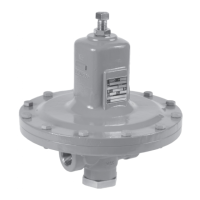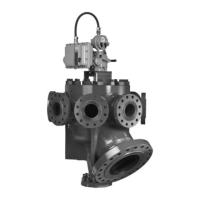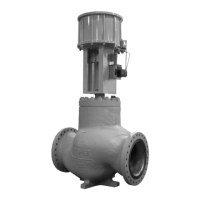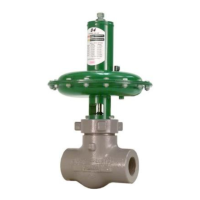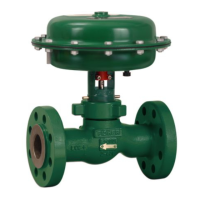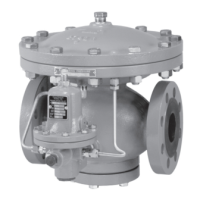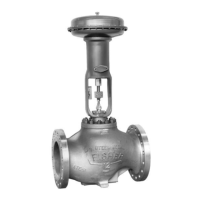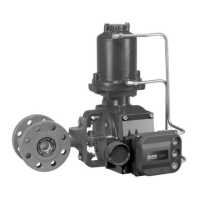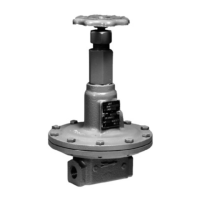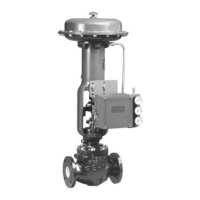!
When inlet pressure rises above the set pressure,
pressure on the pilot diaphragm overcomes the control
spring to stroke the valve plug open. The pilot then
exhausts loading pressure from the top of the main
valve diaphragm. Inlet pressure unbalance overcomes
the main spring force to open the main valve
diaphragm and plug assembly.
As inlet pressure drops below set pressure, the pilot
control spring overcomes the diaphragm force to
stroke the valve plug down to close. Force from the
main spring, along with pilot loading pressure, pushes
the diaphragm and plug assembly onto the tapered
edge seat, producing tight shutoff.
WARNING
Installation
Personal injury, equipment damage or
leakage due to escaping process fluid
or bursting of pressure-containing
parts may result if the Type LR128 is
overpressured or is installed where
service conditions could exceed
the limits given in Specifications
section or where conditions exceed
any ratings of the adjacent piping or
piping connections.
To avoid such injury or damage, install a
Type LR128 relief valve or backpressure
regulator where:
• Service conditions are within unit
capabilities (including those in the
Specifications section).
• Service conditions are within applicable
codes, regulations or standards.
Additionally, physical damage to the
relief valve or backpressure regulator
could break the pilot off the main valve,
causing personal injury and property
damage due to escaping process fluid.
To avoid such injury and damage, install
the regulator in a safe location.
Liquid pressure control systems should
be designed using engineering practices
to eliminate quick control starting or
stopping of the flow stream, which can
produce water hammer.
!
WARNING
The robust design of the Type LR128 allows this relief
valve or backpressure regulator to be installed indoors
or outdoors. Type LR128 is designed to withstand
the elements. The powder paint coating protects
against minor impacts, abrasions and corrosion. When
installed outdoors, the Type LR128 does not require
protective housing. However, the Type MR98H pilot
should be oriented so that the pilot spring case vent
is pointed down. Otherwise, make sure the vent is
protected so that rain, moisture, insects or any debris
will not accumulate inside or block the vent assembly.
When installed indoors, no remote venting is required
except on the pilot spring case. Refer to Step 8 of the
following procedure for the correct venting practices.
1. Only personnel qualified through training and
experience should install, operate and maintain
a relief valve or backpressure regulator. Before
installation, make sure that there is no damage
to or debris in the main valve body or pilot. Also,
make sure that all tubing and piping are clean
and unobstructed.
Note
The Type LR128 internal inlet strainer
is intended to prevent occasional
large particles from entering the main
valve. If the flowing media contains
continuous particles, upstream filtration
is recommended before the main valve
and in the pilot supply piping (reference
Figure 3). See the Specifications section
for the corresponding mesh size of the
internal inlet strainer.
2. A Type LR128 relief valve or backpressure regulator
may be installed in any orientation, as long as flow
through the unit matches the direction of the arrow
on the main valve body and the pilot vent is pointed
down. However, for easier maintenance, install the
regulator with the bonnet up.
CAUTION
Provide adequate support to the bonnet
when disassembling Type LR128
relief valve or backpressure regulator
installed in a vertical installation or
other application where the bonnet is
not oriented upward. Without adequate
support, the bonnet may fall and cause
physical injury when the cap screws
are loosened.
5
Type LR128

